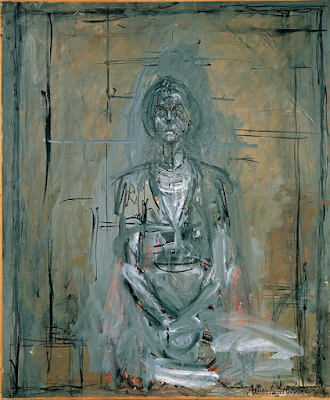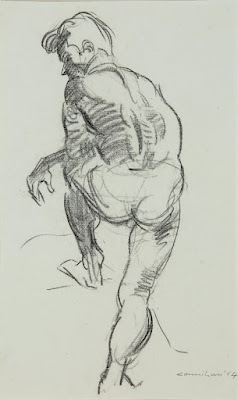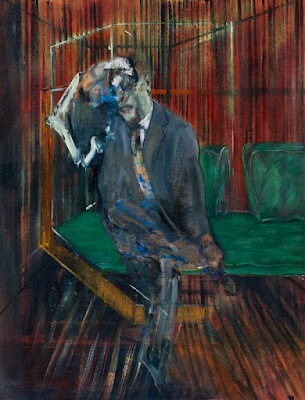 |
| Manolis Polymeris Figure in Red 1951 oil on panel National Gallery, Athens |
 |
| Alberto Giacometti Portrait of Annette 1958 oil on canvas Graphische Sammlung Albertina, Vienna |
 |
| Barry Kay Design for Stage Costume 1954 drawing, with gouache and colored chalks National Gallery of Victoria, Melbourne |
 |
| Marie Laurencin Fairy Flowers 1950 oil on canvas Carnegie Museum of Art, Pittsburgh |
 |
| Noel Counihan Académie 1954 drawing Art Gallery of South Australia, Adelaide |
 |
| Francis Bacon Study for Figure IV 1956-57 oil on canvas Art Gallery of South Australia, Adelaide |
 |
| Panayiotis Tetsis Portrait of Kiki Playiannakou 1954 oil on canvas National Gallery, Athens |
 |
| Panayiotis Tetsis Portrait of Stel Nikolaidis 1955-56 oil on canvas National Gallery, Athens |
 |
| Yannis Moralis Figure 1951 oil on canvas National Gallery, Athens |
 |
| Viktor Ivanov Long Live Our Power! The Homeland of Great Ideas! 1958 lithograph Yale University Art Gallery |
 |
| Yannis Tsarouhis Sailor 1950 screenprint National Gallery, Athens |
-1951-drawing-Carnegie-Museum-of-Art-Pittsburgh.jpg) |
| Willem De Kooning Untitled (Woman) 1951 drawing Carnegie Museum of Art, Pittsburgh |
 |
| Eva Hesse Figure Study 1957 drawing Cooper Hewitt, Smithsonian Design Museum |
 |
| Dimitris Davis Student 1957 oil on canvas National Gallery, Athens |
-Walking-Figure-with-Hanging-Arms-1957-drawing-Statens-Museum-for-Kunst-Copenhagen.jpg) |
| Svend Wiig Hansen Walking Figure with Hanging Arms 1957 drawing Statens Museum for Kunst, Copenhagen |
 |
| Graham Sutherland The Oracle 1959 oil on canvas Carnegie Museum of Art, Pittsburgh |
What can the shadow-like generations of man attain
But build up a dazzling mockery of delight that under their touch dissolves again?
Oedipus seemed blessed, but there is no man blessed amongst men.
Oedipus overcame the woman-breasted Fate;
He seemed like a strong tower against Death and first among the fortunate;
He sat upon the ancient throne of Thebes, and all men called him great.
But, looking for a marriage-bed, he found the bed of his birth,
Tilled the field his father had tilled, cast seed into the same abounding earth.
Entered through the door that had seen him wailing forth.
He sat upon the ancient throne of Thebes, and all men called him great.
But, looking for a marriage-bed, he found the bed of his birth,
Tilled the field his father had tilled, cast seed into the same abounding earth.
Entered through the door that had seen him wailing forth.
Begetter and begot as one! How could that be hid?
What darkness cover up that marriage-bed? Time watches, he is eagle-eyed.
And all the works of man are known and every soul is tried.
Would you had never come to Thebes, nor to this house,
Nor riddled with the woman-breasted Fate, beaten off Death and succoured us,
That I had never raised this song, heartbroken Oedipus!
What darkness cover up that marriage-bed? Time watches, he is eagle-eyed.
And all the works of man are known and every soul is tried.
Would you had never come to Thebes, nor to this house,
Nor riddled with the woman-breasted Fate, beaten off Death and succoured us,
That I had never raised this song, heartbroken Oedipus!
– Sophocles, chorus from King Oedipus (429 BC), translated by W.B. Yeats (1928)